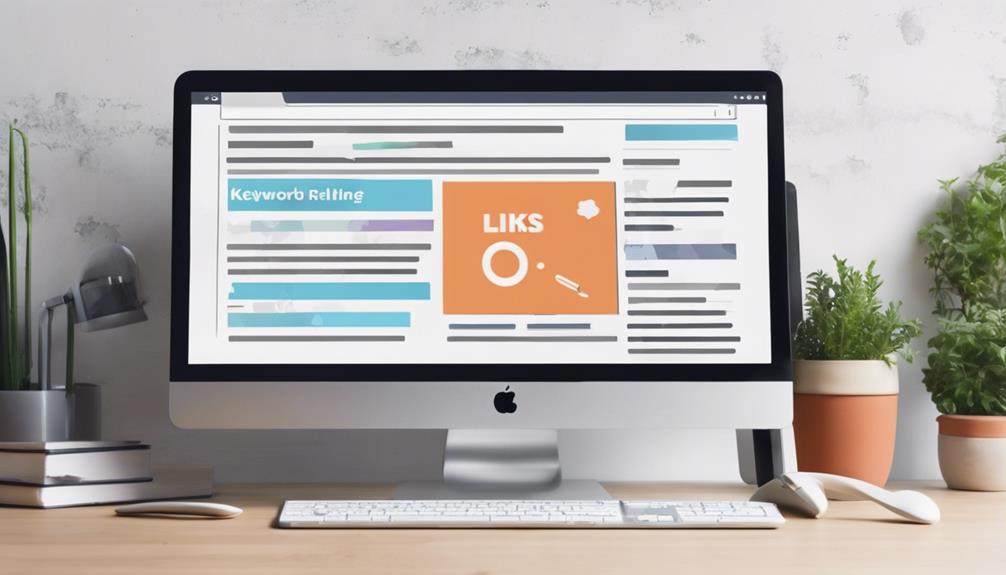
As a beginner diving into the world of SEO, did you know that 67,000 searches are performed on Google every second? Understanding the fundamentals of on-page SEO is your gateway to improving your website's visibility and attracting the right audience.
By mastering key elements like meta tags, keyword optimization, and internal linking, you can lay a solid foundation for your online presence. But, there's more to uncover beyond the basics that can truly elevate your SEO game and set you apart from the competition.
Key Takeaways
- Mastering meta tags, keywords, and internal linking is fundamental for on-page SEO.
- Structuring content with headings enhances readability and user experience.
- Neglecting key SEO factors leads to decreased organic traffic.
- Improved on-page optimization fosters positive user experience and website visibility.
Understanding On-Page SEO
When delving into the realm of on-page SEO, it's crucial to grasp the fundamental principles that govern the optimization of individual webpages for improved search engine rankings and organic traffic.
Effective on-page SEO entails meticulous attention to content, keywords, meta tags, headings, keyword optimization, internal linking, and user experience. By strategically incorporating relevant keywords into your content and optimizing meta tags, you signal to search engines the focus of your webpage.
Structuring your content with headings not only improves readability for users but also helps search engines understand the hierarchy and relevance of information. Internal linking plays a vital role in guiding users to related content and establishing a website's architecture for search engines.
Ultimately, mastering these elements of on-page SEO enhances search engine rankings, drives organic traffic, and fosters a positive user experience, setting you apart from competitors in the digital landscape.
Importance of On-Page Optimization
Improving your on-page optimization is crucial for boosting your website's visibility and search engine rankings.
By focusing on elements like title tags, meta descriptions, and headings, you can enhance your content's relevance to user searches.
Neglecting these key SEO factors could lead to decreased organic traffic and missed opportunities to engage with your target audience.
SEO Impact
Enhance your website's visibility and performance by prioritizing on-page SEO optimization, a crucial aspect for achieving higher search engine rankings and increased organic traffic. On-page SEO factors like meta descriptions, internal links, and user experience directly impact your site's search ranking and overall visibility. For instance, 75% of users never scroll past the first page of search results, emphasizing the importance of ranking well. Moreover, Google's algorithm favors websites with fast load times, typically under 2 seconds, underlining the necessity of optimization. Proper on-page optimization can also lead to a significant 434% increase in indexed pages and a 30% boost in organic traffic. By focusing on these elements, you can improve your website's search ranking and drive more organic traffic effectively.
| On-Page SEO Factors | Impact |
|---|---|
| Meta Descriptions | Higher search ranking |
| Internal Links | Improved website visibility |
| User Experience | Increased organic traffic |
Ranking Factors
Prioritizing on-page optimization is crucial for maximizing your website's ranking potential and increasing organic traffic significantly. When focusing on ranking factors, consider the following key elements:
- Title Tags and Meta Descriptions: Enhance click-through rates and search engine rankings.
- Internal Links: Improve user experience and site authority.
- URL Structure: Aid in user understanding and search engine relevance.
- Header Tags: Organize content hierarchically for both users and search engines.
Keyword Research for SEO
Conducting thorough keyword research is essential for optimizing your on-page SEO strategy. It lays the groundwork for understanding user search behavior and crafting targeted content. Utilizing tools like SEMrush and Ahrefs can provide valuable insights into keyword search volume and competitiveness.
Long-tail keywords, which target niche audiences with specific phrases, often present opportunities with lower competition levels. Understanding the search intent behind keywords is crucial for creating relevant and valuable content that aligns with what users are actively seeking.
Content Quality and Uniqueness
To establish a strong foundation for your on-page SEO strategy, ensuring the quality and uniqueness of your content is paramount for standing out in search results and captivating your audience's attention. Here are some key points to consider:
- High-Quality Content: Google values relevance and user satisfaction, so creating informative and well-researched content is crucial for SEO success.
- Uniqueness: Standing out from competitors and attracting organic traffic requires unique content that offers value to your audience.
- Credibility and Engagement: Well-researched and original content increases credibility and engagement with users, leading to better rankings.
- Value Propositions: Incorporating unique value propositions in your content not only improves SEO but also enhances user experience and trust in your brand.
Technical On-Page Elements
When optimizing your website for search engines, focusing on technical on-page elements such as meta tags, headings, and internal links is essential for enhancing visibility and understanding. Including relevant meta tags helps search engines understand your content better, while well-structured headings make it easier for both users and search engines to navigate your page. Internal links not only improve user experience by guiding visitors to related content but also help search engines crawl and index your site more effectively.
| On-Page SEO Elements | Description | Importance |
|---|---|---|
| Meta Tags | Provide metadata to search engines | Enhances visibility |
| Headings | Organize content and improve readability | Aids understanding |
| Internal Links | Connects pages within the site | Enhances navigation |
Image and URL Optimization
Enhancing the visibility and effectiveness of your website extends beyond technical elements; now, we explore the crucial strategies of image and URL optimization to further boost your online presence.
- Image Optimization: Adding descriptive filenames and alt text improves web accessibility and search engine visibility.
- Page Loading Speed: Proper image optimization enhances page loading speed and user experience.
- Keyword Relevance: Using relevant keywords in image filenames and alt text can increase organic traffic and search engine rankings.
- Engagement Boost: Optimizing images reduces bounce rates and increases engagement on webpages.
Internal Linking Strategies
When it comes to internal linking strategies, focusing on the importance of anchor text and link relevancy is key.
By strategically using relevant anchor text in your internal links, you provide valuable context to search engines about the linked content.
This practice not only enhances user experience but also aids in establishing topical relevance, ultimately boosting your overall SEO performance.
Anchor Text Importance
To maximize the impact of your internal linking strategy, carefully selecting and utilizing descriptive anchor text is essential for enhancing your website's SEO performance. When it comes to anchor text importance in internal linking strategies, consider the following:
- Clarity: Ensure your anchor text clearly describes the linked page's content for both users and search engines.
- Relevance: Use anchor text that's relevant to the linked page to improve website navigation and SEO rankings.
- Avoid Generic Text: Steer clear of generic phrases like 'click here' and opt for keyword-rich anchor text for better SEO value.
- Diversity and Relevance: Striking a balance between anchor text diversity and relevance is key to effective on-page SEO and strategic internal linking.
Link Relevancy
Optimizing link relevancy within your internal linking strategies is crucial for enhancing your website's SEO performance and user experience. Internal linking plays a vital role in improving website navigation, establishing connections between pages, and guiding users to relevant content.
By using relevant anchor text in your internal links, you help search engines better understand the context and significance of linked pages, ultimately boosting your site's visibility and ranking. Additionally, strategic internal linking contributes to spreading link equity across your website, potentially increasing the ranking of interconnected pages.
This not only aids search engine crawlers in efficiently indexing new pages but also enhances user engagement by directing visitors to related content, thereby reducing bounce rates and improving overall site performance.
Monitoring and Updating Content
Regularly monitoring content performance and user engagement metrics is crucial for identifying areas that require improvement. By staying on top of how your content is faring, you can make informed decisions to enhance its effectiveness.
Here's how you can effectively monitor and update your content:
- Utilize keyword research: Update your content based on relevant keywords and current search trends to increase visibility.
- Track with analytics tools: Leverage tools like Google Analytics and Google Search Console to measure changes in rankings and click-through rates.
- Conduct A/B testing: Test different versions of your content to determine what resonates best with your audience and drives more traffic.
- Implement a content calendar: Schedule regular updates to ensure your content remains fresh, engaging, and aligned with your audience's needs.
Can You Provide More Advanced On-Page SEO Techniques for Beginners?
Absolutely! When diving into onpage SEO basics, beginners should start utilizing advanced techniques like optimizing for featured snippets, creating cornerstone content, and improving site load speed. Additionally, focus on internal linking, using structured data, and optimizing for mobile-first indexing to enhance on-page SEO efforts.
Conclusion
As you conclude your journey into mastering on-page SEO basics, remember that success lies in the details.
By strategically optimizing your content, analyzing user intent, and continuously updating your website, you'll achieve remarkable results.
Coincidentally, your dedication to precise execution won't only elevate your search engine rankings but also set you apart from competitors.
Stay focused, stay analytical, and watch your digital presence flourish with every strategic move you make.
- How to Track and Improve Website Conversion Rates - 14/01/2026
- Best Practices for Call-to-Action Buttons - 09/01/2026
- The Psychology of Colours in Web Design - 04/01/2026


